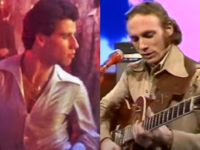Slotted high on lists as one of the greatest debut albums of all time, Buffalo Springfield introduced the public to a revolutionary new sound.
Comprised of Stephen Stills, Neil Young, Richie Furay, Bruce Palmer and Dewey Martin, the collective talents of these fellows equaled a unified whole. Prior to getting together in the spring of 1966, the members of the Los Angeles, California based band boasted diversified musical backgrounds, which clearly played a pivotal role in their ability to assimilate styles and do so with substance.
Although plenty of groups excelled at genre-blending (think the Beatles, the Byrds, the Lovin’ Spoonful and the Beau Brummels), Buffalo Springfield lifted the practice to an entirely different dimension that impressed on a variety of levels. Expertise songwriting, involving arresting melodies and alert and aware lyrics, matched by professional but honest musicianship, were the meat of the matter that provided the band legs to stand on.
Rife with forward thinking structures, “Nowadays Clancy Can’t Even Sing” rotates around and around to an aural carnival consisting of jazz arrangements, inventive tempo changes, psychedelic expressions and gripping pop hooks, while the fast-picking pulsations of “Pay The Price,” the raspy-throated “Hot Dusty Roads” and the toe-tapping strum of “Go And Say Goodbye” are catchy country rockers.
Sleepy-eyed and rather spacey, “Out Of My Mind” logs in as a brooding ballad, “Burned” bristles with raw-boned garage rock advances, and both “Flying On The Ground Is Wrong” and “Sit Down I Think I Love You” (the latter was covered by the Mojo Men, who gleaned a top forty winner with their comparably effective version) shimmer and glimmer with impeccable pop polish and precision.
Exciting guitar work, anchored by fetching chord patterns, mated with gorgeous folk pop fashioned harmonies, also shape the tunes on Buffalo Springfield (Atco Records). Slick and sophisticated, but loose and flexible, the disc offers a captivating mix of intelligence, maturity and roots flavored rock and roll.
Two versions of Buffalo Springfield are actually available. How that happened was, early in 1967, the band scored a No. 7 nationwide hit with “For What It’s Worth,” a crisp and cracking comment on the riots, concerning youth versus police, then occurring on the Sunset Strip in Hollywood. Since the candid anthem was released after Buffalo Springfield appeared in the stores, it was not included on the album. Atco, eager to make as much money as possible, duly reissued the disc — and did so by removing “Baby Don’t Scold Me” from the original album and replacing it with the red hot single.
Created at an hour when rock music was embracing and expanding boundaries left and right, Buffalo Springfield presented a cool and unique spin on the scene. The guys in the band, however, were not satisfied with the recording, saying the production fails to reflect the energy they projected in live settings.
Band remarks aside, as we know musicians are their own worst critics, Buffalo Springfield holds tight as an extraordinary effort, as are the group’s subsequent ventures. The band is just as influential today as they were when they were intact, and that alone proves their value.
- Why Aerosmith Finally Broke Through With ‘Get Your Wings’ - March 5, 2024
- How ‘The Birds, the Bees and the Monkees’ Blew Away Their Pre-Fab Image - April 10, 2023
- Steve Howe Made a Colorful, Quite Surprising Debut With Tomorrow - February 20, 2023




